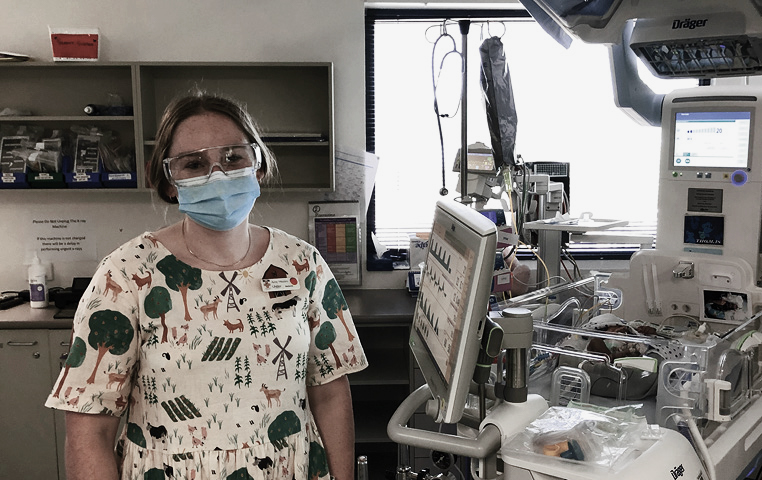Future Focus: Amy Healey
Amy Healey, a final year student at The University of New South Wales, secured a four-week elective with the neonatal intensive care team at The Royal Hospital for Women, Sydney.
During her time in the neonatal intensive care team, Amy experienced a steep learning curve, witnessing some incredibly confronting cases which challenged her not only professionally but also personally. Read a full account of Amy’s experience below.
A challenging start to life
I was fortunate enough to complete my elective term at the Royal Hospital for Women, where I worked within the neonatal intensive care team. The focus of my term was to gain a greater understanding of neonatal abstinence syndrome – a condition in which neonates are born with some form of addiction or tolerance to a drug or medication.
This occurs secondary to the mother using drugs – either illicit or legal, during the pregnancy. These drugs or medications can range from anti-depressant medications to substances of abuse including methamphetamines (‘ice’), opioids, or MDMA/ecstasy, however my focus was on illicit drug use. As part of this term, I also had interactions with infants who suffered fetal alcohol syndrome and infants who had exposure to cigarettes/nicotine during utero.
The children we cared for were, for the most part, acutely unwell and would recover from their addiction quickly. However, the learning, social and physical challenges they are likely to face throughout their lives is difficult to grasp without holding resentment towards their parents. It is a strong reminder that we do not get to choose our parents and their living circumstances – many of these mothers are single, face challenges with housing and have suffered traumatic experiences throughout their lives that have driven them to engage in substance misuse.
As a result of these circumstances, many of these children end up in foster care; either at the mothers wish or legal intervention. I was able to follow up with some of the discharged infants, who are now in foster homes with loving individuals and families. It is so warming to know that there are such selfless people within our communities who will go out of their way to give these kids the life they deserve. It is warming to know these children are loved and given every opportunity to be healthy, despite their difficult start to life.
Some of the infants who were born prematurely and underweight as a result of their drug exposure had very extended stays in the intensive care ward, as their medical complications from entering the world early outweighed their complications from drug exposure. Despite being premature, often with a multitude of health problems, they all have unique personalities and curiosities for the world. However, it was very difficult to come to terms with the fact that not all outcomes for these children are positive.
This placement provided me with a very steep learning curve in the medical treatment associated with these presentations, however the biggest challenge was the balance between compassion and frustration.
 Baby J
Baby J
One of the babies I met during my elective was baby J. Born at 22 weeks’ gestation he faced huge difficulties from prematurity, drug exposure in utero, and likely removal from his family for his protection. Baby J has had at least 7 surgeries since birth, sadly, the expectation of his survival is low. He has been on a ventilator since birth, and if he survives, will likely have to remain on oxygen therapy his entire life. He will likely be blind, infertile, unable to eat and need to be fed parenterally (though a drip). Unfortunately, there are cases like baby J’s in which continuing medical intervention may be futile, and decision on what is best for the child needs to be considered. Patients like baby J have made me revisit the ethical debate surrounding quality of life versus length of life, and at what point extending life becomes cruel rather than beneficial. It takes a great deal of emotional strength to have these discussions with family and loved ones of a patient, however it is a vital part of being a doctor.
Elective conclusion
I have learnt so much throughout this experience, not only from a medical learning perspective, but also with regards to my emotional development. I was able to explore the technical aspects of medical care in the intensive care setting, however the greatest skills I will take away are compassion, non-judgemental understanding and treatment alongside ethical decision making. Many aspects of a career in the medical field are not glamourous, particularly in fields of addiction and drug use.
Through social change I hope that we can support these women to move away from drug use, whether that be through availability of public housing, counselling and mental health support or education and health literacy. By reducing the number of women turning to drug use, we can in turn reduce the number of children going through needless health crises, and hopefully give children the loving, healthy start to life they deserve.
This experience was made possible thanks to the BOQ Specialist FutureFocus grant. My financial stressors were greatly reduced during my elective period, as the grant helped cover the costs of my accommodation and transport during my elective. I am so grateful to this support and generosity.
 Facebook
Facebook
Like and follow us on Facebook to keep up to date with all our student offers, events, competitions and more.